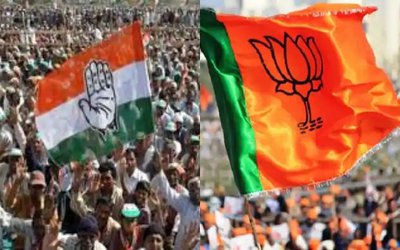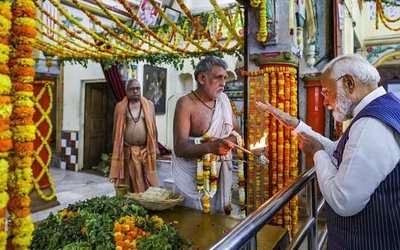
The Drugs Controller General of India approved 2-DG for emergency use as an adjunct therapy in moderate to severe coronavirus patients earlier this month.
The first batch of anti-COVID oral drug 2-DG, developed by the DRDO, was rolled out on Monday as a severe wave of the coronavirus pandemic continued to ravage large parts of India.
Releasing the drug along with Health Minister Harsh Vardhan, Defence Minister Rajnath Singh said 2-deoxy-D-glucose (2-DG) has brought a "new ray of hope" in the treatment of COVID-19 patients and exuded confidence that it would be effective.
The Drugs Controller General of India (DGCI) approved 2-DG for emergency use as an adjunct therapy in moderate to severe coronavirus patients earlier this month.
"This is a great example of the scientific prowess of our country," Singh said in his brief remarks. The defence minister also listed the efforts of the armed forces in helping the civilian authorities deal with the pandemic across the country, but asserted that their deployment has not impacted the military's operational preparedness at the borders.
"Even after going through all these difficulties, we have ensured that our preparedness at the border does not have any impact. There is no shortage of enthusiasm of our forces anywhere. We know this very well, no matter how big the difficulty is, we will overcome it," he said.
About the coronavirus crisis, Singh said it is not the time to relax and get tired as there is nothing definitive about the course of the pandemic.
"We do not need to be relaxed nor should we get tired, because this wave has come for the second time and there is nothing definite about this. We have to take steps with full caution," he said at the event at the DRDO headquarters here.
Singh said the government has taken the overall situation seriously, whether it is the matter of oxygen supply or ensuring ICU beds or the arrangement of cryogenic tankers for the transportation of liquid oxygen.
"I am happy to say that the Medical Corps has also decided to take back its retired doctors so that our health system can be strengthened further. I heartily commend such physicians who are joining this campaign even after their service," he said.
The anti-COVID-19 therapeutic application of 2-DG has been developed by the Institute of Nuclear Medicine and Allied Sciences (INMAS), a leading laboratory of the Defence Research and Development Organisation (DRDO), in collaboration with Dr Reddy's Laboratories (DRL) in Hyderabad.
"I was told that by using it (2-DG), people have recovered two-and-a-half days earlier than the usual treatment period. Oxygen dependency has also been reduced by about 40 per cent in the patients. Its powder form is also a major feature as people will be able to use it very easily like the ORS solution," Singh said.
Urging all the institutions concerned to walk shoulder-to-shoulder, he said the country will come out victorious in facing any crisis if everyone works unitedly.
The defence ministry, on May 8, said the clinical trials of 2-DG showed that it helps in a faster recovery of hospitalised patients and reduces the supplemental oxygen dependence.
The approval of the drug has come at a time when India is grappling with a record-breaking wave of the coronavirus pandemic that has stretched the country's healthcare infrastructure to its limit.
The drug comes in a powder form in a sachet and is taken orally by dissolving it in water, the ministry said.
In efficacy trends, it said, the patients treated with 2-DG showed a faster symptomatic cure than the standard of care (SoC) on various endpoints.
Source: India Today
- ICIMOD Says Hindu Kush Himalaya (HKH) Faces Lowest Rainfall In Third Conseqquetive Year
- Apr 19, 2025
- Tatopani Border Point Will Be Upgraded: Foreign Minister Dr. Deuba
- Apr 19, 2025
- Zelenskyy accuses China of supplying weapons to Russia
- Apr 19, 2025
- Trump says he still hopes for peace in Ukraine after Rubio's warning
- Apr 19, 2025
- Japan-US Trade Meeting Concluded In Washington
- Apr 18, 2025















